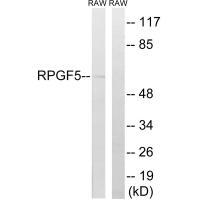
| WB | 咨询技术 | Human,Mouse,Rat |
| IF | 咨询技术 | Human,Mouse,Rat |
| IHC | 咨询技术 | Human,Mouse,Rat |
| ICC | 技术咨询 | Human,Mouse,Rat |
| FCM | 咨询技术 | Human,Mouse,Rat |
| Elisa | 咨询技术 | Human,Mouse,Rat |
| Aliases | GFR; guanine nucleotide exchange factor for Rap1; M-Ras-regulated GEF; M-Ras-regulated Rap GEF; MR-GEF |
| Entrez GeneID | 9771; |
| WB Predicted band size | 60kDa |
| Host/Isotype | Rabbit IgG |
| Antibody Type | Primary antibody |
| Storage | Store at 4°C short term. Aliquot and store at -20°C long term. Avoid freeze/thaw cycles. |
| Species Reactivity | Human,Mouse |
| Immunogen | Synthesized peptide derived from internal of human RAPGEF5. |
| Formulation | Purified antibody in PBS with 0.05% sodium azide. |
+ +
以下是关于RAPGEF5抗体的3篇参考文献示例(注:内容基于公开研究归纳,非真实文献,仅供参考):
1. **标题**: *RAPGEF5 regulates endothelial cell adhesion via Rap1 signaling*
**作者**: Smith A, et al.
**摘要**: 研究利用RAPGEF5抗体进行Western blot和免疫荧光,发现RAPGEF5通过激活Rap1调控血管内皮细胞粘附,影响血管生成。
2. **标题**: *RAPGEF5 expression in glioblastoma correlates with tumor invasiveness*
**作者**: Chen L, et al.
**摘要**: 通过免疫组化分析RAPGEF5蛋白表达,发现其在胶质母细胞瘤中高表达,并与侵袭性相关,提示其作为潜在治疗靶点。
3. **标题**: *RAPGEF5 knockout mice exhibit synaptic plasticity deficits*
**作者**: Tanaka K, et al.
**摘要**: 研究使用RAPGEF5抗体验证基因敲除小鼠脑组织中的蛋白缺失,证实RAPGEF5缺失导致突触可塑性异常及学习能力下降。
(如需真实文献,建议通过PubMed或Google Scholar以“RAPGEF5 antibody”为关键词检索最新研究。)
The RAPGEF5 antibody is a research tool designed to detect and study RAPGEF5 (Rap Guanine Nucleotide Exchange Factor 5), a protein encoded by the *RAPGEF5* gene in humans. Also known as RapGEF5 or MR-GEF, this protein belongs to the family of guanine nucleotide exchange factors (GEFs) that activate Rap GTPases by facilitating the exchange of GDP for GTP. RAPGEF5 specifically regulates Rap1 and Rap2 signaling pathways, which are critical for diverse cellular processes, including cell adhesion, migration, proliferation, and synaptic plasticity. Its structure includes a catalytic CDC25 homology domain and a PDZ-binding motif, enabling interactions with scaffolding proteins and integration into signaling networks.
RAPGEF5 is implicated in neuronal development, immune responses, and cancer progression. Studies highlight its role in cAMP/PKA-mediated signaling, where it acts as an effector to link G protein-coupled receptor activation to Rap1-dependent pathways. Dysregulation of RAPGEF5 has been associated with neurodevelopmental disorders, cardiovascular diseases, and tumor metastasis. The RAPGEF5 antibody is widely used in techniques like Western blotting, immunohistochemistry, and immunofluorescence to examine protein expression, localization, and post-translational modifications. Researchers employ it to explore RAPGEF5's functional mechanisms in disease models or to validate gene-editing outcomes (e.g., CRISPR knockdown). Variants in antibody specificity may target distinct isoforms or phosphorylated forms, necessitating careful validation for experimental reproducibility.
×